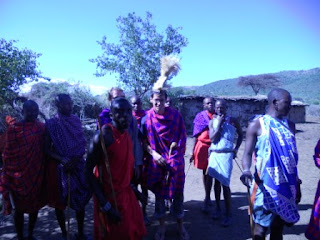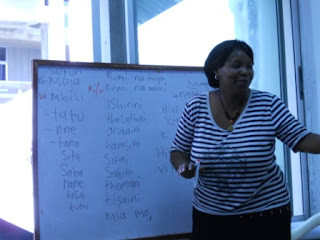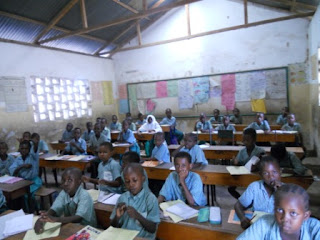2 weeks ago, I went to visit a Maasai village during our safari in Maasai Mara with the other people participating in my program. It was incredible. These are some photos from the trip
Here is a picture of a hut in the Maasai village. It is made out of cow poop, wood, mud and hay. Even the roof is made out of cow poop, wood, mud, and hay. Apparently cow poop is pretty water proof. The women of the village build the homes in the village while the men like to sit around and talk about the good times they had and make fun of the various white people visiting their villages.
On a side note, the dirt in front of the house is not dirt. It is cow poop. The entire village was covered with cow poop. I have never seen so much poop in one place in my life. Poop was everywhere. Dry poop, wet poop, any kind of poop EVERYWHERE. The dry poop turned to dust and was floating everywhere. I was not only covered by poop dust, but also breathing in poop dust. Our tour guide did not mention there is so much poop in a Maasai village so most of the group, including myself, was in sandals (her excuse was typical Kenyan, "It's just poop."). One girl in our group was in high heels walking through the poop.
The Maasai decided to greet us by singing a traditional song and doing a traditional dance. Their song consisted of the men saying a deep-throated "HOOOO!" in various tones over and over again. Their dance consisted of jumping up and down as high as they can. Apparently in this culture, the higher you can jump, the less of a dowry you have to pay to your future wife's family.
In this photo, they decided that I should dance with them. They put a traditional Maasai cloth over me (which they later tried to sell me, this became a recurring theme throughout the visit) and gave me a traditional Maasai dancing stick.
More dancing and singing. As you can see in the photo, the Maasai men all hold some sort of a stick. These sticks represent that each of these people are adult men and are given to them by their parents when they reach adulthood.
Tyler, one of the other interns here from Washington D.C., decided to join me and the Maasai in our singing and jumping. I did not jump very high. I think if I was a Maasai, I would have to pay a high dowry. Tyler and I were told we were poor excuses for Maasai and they took my dancing stick away from me.
This is a picture of a Maasai machete. All the Maasai men carry a machete with them in addition to a stick to signify they are adults. Some of the Maasai were even holding spears. We were told these weapons were to kill lions that sometimes come in to the village to eat their livestock
In addition to their sticks, when the Maasai reach adulthood (generally regarded as around 18 years old) they receive a machete. When they reach this age, all the men in this age range are gathered and circumcised in front of the entire village. The men are expected to bare the pain and not cry or make any sound. If they make a sound, they are regarded as a "weak" man.
After the circumcision, the men are all sent out to live in the bush by themselves to live off of the land for the next 3 years. They can often be seen hunting for Coca-Cola in convenience stores or French fries at local restaurants in Mombasa and Nairobi. They are considered Maasai Warriors during this stage of their lives. At the end of this stage of their lives, the Warriors are required to kill a lion to be fully recognized as a man. The Warrior that puts the fatal wound in to the lion is regarded as the manliest Warrior and is hailed as a hero when he returns to the village. After the lion is killed, the warriors make jewelery out of the lions teeth and skin. The jewelery is worn by the Warriors to signify them reaching their manhood. The Maasai have also modernized in that if you choose to go pursue an education and finish high school and attend college you do not have to become a Warrior.

The Maasai tribesmen show us how to make fire. They rubbed a stick into a piece of wood and had a raging fire going in less than 5 minutes. It was pretty cool.
This is a picture of me with some Maasai tribesmen. The guy on the left was the son of the chief.
After the tour, our tour guide left us without telling us to take one of the people on our tour home because she was not feeling well. These guys offered to take us back to our campsite, but we were not very trustful of this guy being our guide because he seemed sleazy. After being in this country for a while all of the interns became a little distrustful of most Kenyans that we randomly met as we learned most of them see us as "rich white people" and will try to sell us anything and everything. This guy was way more sleazy than any other Kenyans we met. The son of the chief tried to sell us everything from his stick to all the clothes he was wearing to even his house. We reluctantly agreed to have him walk us back to our camp site. While he was walking us back, I mentioned to one of the other interns that it was "bullshit" that the tour guide would leave us alone with this man we just met and when he heard the word "bullshit" he flipped out. He told me that using the word is completely inappropriate and that I shouldn't be saying words like that especially if it is directed towards the Maasai. The group and myself were pretty scared considering we were in the middle of a forest alone with a sleazy guy who was carrying a massive machete and a big stick (not to mention the surrounding areas had wild lions, cheetahs and leopards). Thankfully, our tour guide arrived at that time in our safari van to pick us up.

Inside the chief's son's luxury hut. As you can see, this has many of the modern amenities any Maasai would expect in a modern Maasai home like cow poop floors and a charcoal stove. The huts are very small (probably around 100 sq ft) and the ceilings are very low (around 5 ft) despite the Maasai being pretty tall people. Each hut houses one family. There is no electricity or water. Every morning the women have to walk considerable distances to fetch water from the local river.
Another picture inside the chief's son's hut. The walls inside the house were made of cow poop, wood and mud. Even some of the seats we were sitting on were made out of cow poop and mud. For as much cow poop and mud there was, the Maasai all had very clean clothes and shoes.
Yet another picture of the inside of the chief's son's hut. It's not very clear but on the left side there is the chief's son's son on his bed. His bed was made out of twigs. Surprisingly, the bed was not made of cow poop and mud.
This is a picture of an animal pen. Livestock such as goat, sheep and cows are kept in this pen during the night to protect them from the lions, cheetahs, leopards, and other predators. The Maasai are mainly known to herd cattle and on our way to Maasai Mara we were forced to wait for a herd of cows to cross the highway many times. The Maasai depend on cow for many things including meat, milk and blood. One of the favorite drinks of the Maasai is cow blood. To get the blood, they slit the cow so that it bleeds enough blood to drink, but not die. Writing this makes me soooo thirsty...
The floor of this pen is also covered in cow poop. I have to say though that even though everywhere was covered with poop, it was cleanly swept poop. I didn't see any litter or garbage in the poop and it was usually evenly distributed. I've noticed during my trip that Kenyans like really clean living spaces. Even if the floor is poop, it is cleanly swept poop.
The Maasai "market". "Market" is in quotation marks because the market is to sell some arts and crafts to the white people that visit the village. The Maasia are surprisingly sophisticated salesmen. They separated each person in our tour group and assigned 2 Maasai to each person. The Maasai would then pick products and try to peer pressure us into buying the product at insanely high prices. It was not a very pleasant experience.
A Maasai child wondering around amidst the cow poop. For all the cow poop in the villages, the children in the village appeared very healthy and having a good time.























































